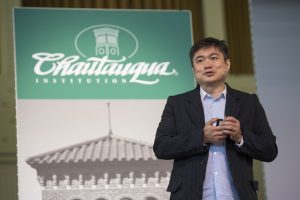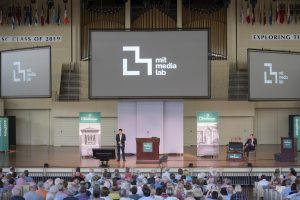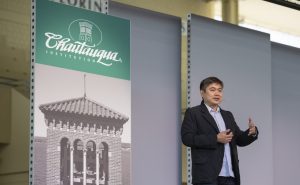
Occasionally referred to as the “department of none of the above,” Joi Ito’s Media Lab does not prescribe to any singular discipline; rather, it believes in holistic approaches that predict the future by inventing it.
Ito, activist, entrepreneur and director of the Media Lab at the Massachusetts Institute of Technology, spoke at 10:45 a.m. Wednesday in the Amphitheater, continuing Week Eight, “Shifting Global Power.”
Programs at MIT are “separated like church and state”; the labs focus on funding and research, and the academic programs focus on degrees and courses. But Media Lab does both.
“We learn through construction rather than instruction, and that allowed us and gave us license to match church and state together and say we are going to do projects, we are going to build things,” Ito said. “But over the course of building things, we are going to also learn things.”
Just as “drunks look for keys under the lampposts because that’s where the light shines,” Ito said the students in the Media Lab have the potential to find “keys” too, as long as they are given the proper tools to explore.
“The image we have is, we give our students and faculty flashlights so they can walk around between the lampposts and find important things that wouldn’t otherwise be found,” he said.
Ito said the lab is “lucky” to operate with a unique funding model that includes over 90 contributing companies. Ito refers to the Media Lab’s financial support system as a “gym membership.”
“I call it a gym membership because they all have to pay even if they don’t show up, and they have to work really hard to get anything out of it,” Ito said. “But they show up, and it’s all discretionary and all of the intellectual property and all of the ideas are shared by all of the companies.”
Companies like Google, Sony and Samsung work alongside the lab to help Ito and his students “work on the future together,” which Ito said creates an opportunity to invent technology no one else will fund. The last time Ito hired a professor, the job posting said the lab was looking for a professor of “other.” The professor had to be interested in two fields that had nothing to do with each other, and that MIT was not already researching.
“If they could get funded anywhere else in the world to do what they wanted to do, they shouldn’t come, and if anyone else would hire them to do what they want to do, they shouldn’t come,” Ito said. “That’s the core DNA of our lab: try to constantly be looking for the other, try to explore those spaces that no one else will do because we have both the freedom and responsibility to explore those places.”
In the “early days of the lab,” Ito said its mantra was “let’s just build things.” Now, the work is more focused on the societal and ethical implications of technology.
The lab is currently comprised of 25 areas of focus, ranging from synthetic biology to the future of opera, to education and learning, to robotic limbs. Of the focus areas, 30% have to do with life sciences.
When Ito was hired as director of the lab in 2011, he had yet to earn an undergraduate degree — everything he learned, he learned online.

“It turned out that my sensibilities of building things on the internet were very similar to the sensibilities of the Media Lab,” he said.
But the internet didn’t always have the capabilities it does now, and according to Ito, things moved rather slowly at first.
Jobs before the internet, like those in economics, were straightforward; one learned a certain set of skills and then repeated them throughout their life.
Then the internet happened.
“Suddenly, everything was connected; suddenly, everything moved faster; suddenly, everything became complicated,” he said. “The after-internet world was a world where everything changed. Newton’s laws turned into a local ordinance, and the laws of physics didn’t work anymore. There was a fundamental shift in the way we have to live our lives.”
The impact of the internet has not fully run its course, Ito said. According to him, the internet is doing both tremendous damage and providing tremendous advantages, an idea described by Amara’s law.
“(Amara’s law) states that we always over-anticipate the short-term impact of technology and underestimate the long-term impacts,” Ito said. “I still think we are at the point where we have yet to see the full effects of the long-term impact.”
The first internet server in Japan was housed in the bathroom of Ito’s Tokyo apartment in the early ’90s. All he needed was a few thousand dollars’ worth of internet service technology, most of which he bought as “junk parts” online. What the server allowed was, first, an opportunity for kids to crack into telecommunications as entrepreneurs, an example of “permissionless innovation,” as he had no boss or investors. Second, it also drove the cost of communications to “nearly zero.”
“By lowering the cost of communications, it then created more layers where we could have this permissionless innovation,” he said. “If you think about it, cost is what increases the cost of failure, but it also increases the number of adults you have to have in the room.”
But with less adults in the room, more problems can arise. Ito, with other faculty members, created a set of principles to implement into the Media Lab to address some of those inevitable issues.
The first principle is emergence. With any complex group, Ito said, emergence will occur — and it must be allowed to do so.
“What’s really important is that I think these kids, as we start to democratize and make things available, we can’t do top-down control,” he said. “I think we have to figure out how order emerges.”
Another principle is resilience. Ito thinks people are too focused on reducing their ideas to investments and monetary values.
“What we need to try to do is build a system that is resilient, and I think resilience comes from plurality and heterogeneity and different approaches, rather than trying to reduce things to single measures,” he said.

An additional principle is “disobedience over compliance.” For disobedience, Ito took insight from Martin Luther King Jr., who once said, “It is a moral imperative to obey just laws, but it’s also a moral imperative to disobey unjust laws.”
“Science moves forward by questioning those status quo ideas,” Ito said. “To me, disobedience is an essential piece of academic freedom.”
The last principle Ito discussed was learning, and its importance over education.
“I think that education is what other people do to you, and learning is what I do to myself,” he said. “I think what we need to do is learn to learn. If you learn to learn, you will learn forever.”
But Ito remains unsure as to where people lose their desire to learn and have fun exploring life’s unknowns.
“What happens when a kid suddenly doesn’t want to do their homework anymore, when learning suddenly becomes this chore, when jobs become this thing you do, when you have to have work-life balance because work is so awful?” Ito said.
To be released in September 2019, Ito’s forthcoming Resisting Reduction examines Silicon Valley’s technology takeover. Ito noticed computer scientists in Silicon Valley believe the entire world can be reduced to a formula and that “everything is about optimizing and winning.” The region has thrived on receiving community, national and global feedback about the limits of the technology they have developed; in response, Silicon Valley companies push those limits further.
“They are saying computers will become God and God will just figure it out, and all of this humanity and social foo-foo won’t matter anymore because computers will understand everything,” he said.
Although it may look like their takeover is going to last forever, Ito said even pandemics run their course.
“I am worried we have a cancerous pandemic right now and we are headed in a bad direction,” he said.
Part of that “cancerous pandemic” is a broken system that places too much blame on individuals rather than the system itself.
“We say it’s about the willpower of the individual when it’s not,” Ito said. “It’s the market, it’s the system, it’s this whole crazy machine that we have created that is just now trying to optimize each separate thing.”
To adapt to a more circular model of systems and individuals, Ito models part of the lab on the Krebs Cycle of Creativity, developed by MIT Media Lab faculty member Neri Oxman. At the top of the original cycle is arts, science, engineering and design. In the Media Lab, Ito said the top is perception, and the bottom is production and utility.
“We think science is taking the perception of the natural world and converting it into knowledge,” he said. “We think that engineering is taking that knowledge from science and converting it into utility; and we think that design is taking that utility and converting it into products and social behavior; and we think that art is taking that social behavior and converting it into perception.”
Ito’s adaptation of the cycle focuses on the social side of science, rather than any economic or numerical values. Ito grew up in Japan, where instead of asking “How rich can I become?” people ask, “What kind of ancestors will we be?”
Generation Z, the world’s largest population block, seems to be more focused on asking the right questions, Ito said.
“I think they are different,” he said. “They are very sober, they blame us for everything, but they are very different. Many of them feel that more than enough is too much, and they are disgusted by excess in waste. I think this next generation has a fundamentally different wiring, and I am heartened by them.”
Ito is especially heartened by Generation Z’s use of technology and social media in creating social change in movements like Me Too and Time’s Up, through the efforts of young people after the Stoneman Douglas High School shooting, and the Google Walkout and hashtag #TechWontBuildIt.
To conclude his lecture, Ito told his “favorite story” of U.S. Representative John Lewis who forgave the KKK member who severely beat him during a 1961 Civil Rights march. When people ask Lewis how he forgave him, he tells them, “You always have to leave room for the humanity in the other to come out.”
“For me, I think that is essential,” Ito said. “There is a lot of hate; I think we are afraid of China, I think we are afraid of tech, but I think a key thing we need to do is step back and really allow the goodness to come out. I think it’s there in our kids, and I think it’s there in the hashtag #TechWontBuildIt movement. Bashing won’t fix it — that nuance is essential, and I hope you all will join me.”




